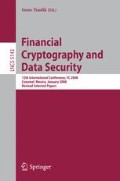Abstract
We introduce phishwish, a phishing filter that offers advantages over existing filters: It does not need any training and does not consult centralized white or black lists. Furthermore, it is simple to configure, requiring only 11 rules to determine the veracity of an incoming email. We compare the performance of phishwish to SpamAssassin and to Google’s browser-based phishing filter. Our results indicate that phishwish outperforms these filters and identifies zero days attacks that went undetected by existing filters.
Access this chapter
Tax calculation will be finalised at checkout
Purchases are for personal use only
Preview
Unable to display preview. Download preview PDF.
References
Dhamija, R., Tygar, J.D., Hearst, M.: Why Phishing Works. In: Proceedings of the ACM Computer/Human Interaction (CHI 2006), pp. 581–590 (2006)
Wu, M., Miller, R.C., Garfinkel, S.: Do Security Toolbars Actually Prevent Phishing Attacks? In: Proceedings of the ACM Computer/Human Interaction (CHI), pp. 601–610. ACM, New York (2006)
Zhang, Y., Egelman, S., Cranor, L., Hong, J.: Phinding Phish: Evaluating Anti-Phishing Tools. In: Proceedings of NDSS (2007)
Zhang, Y., Hong, J., Cranor, L.: CANTINA: A Content-Based Approach to Detecting Phishing Web Sites. In: Proceedings of WWW, pp. 639–648 (2007)
Wu, M., Miller, R.C., Little, G.: Web Wallet: Preventing Phishing Attacks by Revealing User Intentions. In: Proceedings of SOUPS, pp. 102–113 (2006)
Mori, G., Malik, J.: Recognizing Objects in Adverserial Clutter: Breaking a Visual CAPTCHA. In: Proceedings of CVPR, pp. 1–8 (2003)
von Ahn, L., Blum, M., Langford, J.: Telling Humans and Computers Apart Automatically. Comm. of the ACM 47(2), 57–60 (2004)
Author information
Authors and Affiliations
Editor information
Rights and permissions
Copyright information
© 2008 Springer-Verlag Berlin Heidelberg
About this paper
Cite this paper
Cook, D.L., Gurbani, V.K., Daniluk, M. (2008). Phishwish: A Stateless Phishing Filter Using Minimal Rules. In: Tsudik, G. (eds) Financial Cryptography and Data Security. FC 2008. Lecture Notes in Computer Science, vol 5143. Springer, Berlin, Heidelberg. https://doi.org/10.1007/978-3-540-85230-8_15
Download citation
DOI: https://doi.org/10.1007/978-3-540-85230-8_15
Publisher Name: Springer, Berlin, Heidelberg
Print ISBN: 978-3-540-85229-2
Online ISBN: 978-3-540-85230-8
eBook Packages: Computer ScienceComputer Science (R0)

